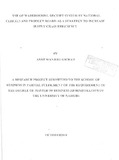| dc.description.abstract | The magnitude, speed and direction of environmental change is increasing at unprecedented rate.
In order for organizations to survive, strategies have to be devised to respond to the forces that threaten to halt survival. Companies that do not respond appropriately are usually phased out of business. Companies respond to the challenges in terms of devising cost cutting strategies ,adopting new technologies, competing on low prices or on high quality product or services, differentiating the market or focus strategies. National Cereals and Produce Board has had its share of environmental impact since liberalization of the Kenyan economy.
The purpose of this study was to determine the use of Warehousing Receipt System at National Cereals and Produce Board as a strategy to increase supply chain efficiency. This was a case study and the researcher used an interview guide as the primary data collection instrument. The interview guide was administered using face to face interviews to seven senior managers at National Cereals and Produce Board. Data collected was analyzed based on content analysis.
According to the findings, Warehousing Receipt System will increase the supply chain
efficiency of the agricultural commodities through facilitating trade, enhancing market
efficiency in agricultural markets, easing access to rural financing, mitigating price risk and enabling cost effective management of public food reserves. The system is still in its pilot stage due to lack of a regulatory frame work/ structure which will ensure that the interest of all stakeholders are taken care of especially the farmers. The financial sustainability of the Warehouse Receipt System without a regulatory framework has been questioned by potential players, the financial sector has been skeptical about use of Warehouse Receipts without additional legislated security. viDue to all this, a legal framework is seen to be the biggest limitation of the new concept and it is believed that a good regulatory framework will bring the desired results if other aspects are
favorable like the infrastructure and technology. The legal framework is currently being
worked on and it is projected to have been put in place by the end of 2011. A well developed collateral management system would complement the services of the operators and inspections where applicable. Certification of a Warehouse demands some minimum requirements of which so far NCPB stores in ten sites with a capacity of approximately fifty four thousand metric tons have been certified. NCPB is also carrying out extensive training to the stakeholders enlightening them on the benefits of this concept. The major players of WRS are the depositor the operator and the
financier. The agricultural commodities deposited in the Warehouses will be traded under Commodity Exchange.
The minimum quantity required from a depositor in order for a Warehouse Receipt which acts as collateral to be issued is ten (10) Metric Tones which translates to one hundred and eleven (111) bags per 90Kg. Those who will not have met the minimum quantity will be issued with a good intake receipt which in the this case will not benefit from the financing but post harvest losses will be reduced | en |

